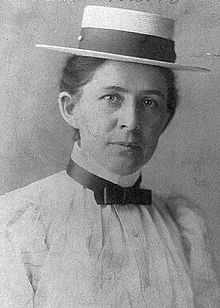Ida Tarbell (Ida Minerva Tarbell)

Ida Tarbell began her career as a teacher at Poland Union Seminary in Poland, Ohio. She taught classes in geology, botany, geometry and trigonometry as well as languages, Greek, Latin, French and German. After two years, she realized teaching was too much for her and that she enjoyed writing more. As a suffragist, Tarbell had determined never to marry and so instead pursued a journalism career. Ida Tarbell returned to Pennsylvania, where she met Theodore Flood, editor of The Chautauquan, a teaching supplement for home study courses at Chautauqua, New York. She was quick to accept Flood’s offer to write for the publication. She later wrote, “I was glad to be useful, for I had grown up with what was called the Chautauqua movement.” In 1886 she became managing editor. Her duties included proofreading, answering reader questions, providing proper pronunciation of certain words, translating foreign phrases, identifying characters, and defining words. “Doing this job I began to think about facts and reading proofs. It was an exacting job which never ceases to worry me. What if the accent was in the wrong place? What if I brought somebody into the world in the wrong year?” In 1890 Ida Tarbell moved to Paris to do postgraduate work in historical research. She already wanted “to rescue women from the obscurity of history.” Specifically, she intended to write a biography of Madame Roland, the leader of an influential salon during the French Revolution, and was able to make use of sources that had never been used, such as family letters. While in France, she wrote short features on prominent Frenchwomen and Parisian life for the syndicate affiliated with Samuel McClure’s magazine. He offered her the position as editor for his eponymous magazine. While working for McClure’s Magazine, Tarbell wrote a popular series on Napoleon Bonaparte.
While based in Washington, D.C., Ida Tarbell conducted research to support her 20-part series on President Abraham Lincoln. This was highly popular, attracting enough new readers to double the magazine’s circulation. The articles were collected in a book, giving Tarbell a national reputation as a major writer and the leading authority on the slain president. Her research in the backwoods of Kentucky and Illinois uncovered the true story of Lincoln’s childhood and youth. As she continued to write about Lincoln, she published a series of articles and books about him and traveled on the lecture circuit, recounting her discoveries to large audiences. In 1899, Tarbell moved to New York where McClure’s was based. In 1901, she began publishing serialized articles in McClure’s that were later collected in the book, The History of Standard Oil (1904). While Ida Tarbell established her reputation in a field dominated by men, her articles and novels about women began to change,starting in 1909. The feminism appeared to fade as she recommended that women embrace home life and the family, saying they had a “true role as wives, mothers and homemakers.” She held this position until her death. Former allies among suffragists were dismayed at her change and her speaking to anti-suffragist organizations. Helen Keller described Tarbell as “getting old.” Historian Robert Stinson believes that she was making new public statements about an ambiguity she had lived in her own life.
Born
- November, 05, 1857
- USA
- Amity Township, Pennsylvania
Died
- January, 06, 1944
- USA
- Bridgeport, Connecticut
Cause of Death
- pneumonia
Cemetery
- Woodlawn Cemetery
- Titusville, Pennsylvania
- USA



